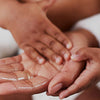Get ready to embrace change and breeze the menopause with these natural tips.
Once upon a time, the menopause simply wasn’t discussed. This important, completely natural transition in every woman’s life was hushed up by society and shrouded in mystery. How very British.
Well, praise be, that’s no longer the case! Indeed, we now know the menopause can be a wonderful and empowering time in our lives; a celebration of the next chapter, and freedom from being a slaver to our relentless hormone cycles. You’re officially there when you’ve gone twelve months without a period – the average age for this is 51. Before that comes the perimenopause, which begins up to a decade prior, when hormones start to decline.
Full disclosure: it might not be all plain sailing but, arm yourself with the facts, and you’ll be ready to embrace this natural transition. So let’s look at some of the changes you may notice, and the healthiest holistic hacks for riding them out smoothly.

Be a cool customer
Hot flushes can be a natural symptom of fluctuating oestrogen levels. Thankfully, there's plenty you can do to take control.
Wear layers of thin clothing so that you can remove them as and when a flush occurs – natural fabrics such as cotton and linen are best. And if you think working up a sweat in the gym will make matters worse, you’ll be surprised to know the opposite is true: “Research shows that regular exercise – three hours of brisk walking, stretching, muscle-strengthening and relaxation exercises a week – can reduce even severe menopausal symptoms,” says Tania Adib, consultant gynaecologist at The Medical Chambers, Kensington. “To boost your intake of natural plant oestrogens, aim to eat more beans, dark green leafy vegetables, nuts and seeds, especially flaxseed, wholegrains, fresh and dried fruit.”
Dodge weight gain
Low oestrogen levels can cause a redistribution of fat around the body. “Fat tends to move from the buttock and onto the tummy,” explains Tania. “A lot of women can develop underactive thyroid at this time, too. And thirdly, high levels of cortisol, caused by stress, can make you gain weight around the middle.” Extra weight can impact on health, but there’s no need to fret – a few lifestyle adjustments can help. “Aerobic exercise will work your cardiovascular system,” says Tania. “Weight-bearing exercise maintains muscle mass, which will also give you a higher metabolic rate.” Tania also recommends yoga and meditation to banish stress.
Keep calm and collected
We all feel anxious from time to time, but if you’ve gone from a carefree gal to a worrywart overnight, speak to your GP who can discuss a range of options to help resolve the issue. A new survey from Anxiety UK has found 85 per cent of women felt their anxiety was triggered by the menopause, so it’s important you don’t suffer in silence. Your mental health always deserves just as much care and attention as its physical counterpart, so during the menopause this should be no different.
Get skin glowing

Some women notice skin changes as they approach menopause. Decreasing oestrogen levels can cause us to lose collagen, and our complexion can appear thinner. “The most common complaint is itching and dry skin,” says Dr Louise Newson, founder of the Balance app and The Menopause Charity. “Soap can be very drying, so avoid products that lather, foam or bubble, as they strip away natural oils. If your skin is still dry, use a moisturising lotion as a soap substitute.”
Furthermore, pack your plate with omega 3-rich foods and veg that’s bursting with vitamin C to help you glow from the inside out.
Have luscious locks
While hair loss may alarm you, rest assured it’s a very common occurrence from perimenopause onward. As the hormones progesterone and oestrogen decline, testosterone can increase. “Thinning hair becomes more common from your 40s,” says Dr Valeria Acampora, a hormone specialist at The Marion Gluck Clinic.
Another culprit is stress. To the rescue? Stress management and dietary tweaks: “Managing stress, taking more exercise and eating a healthy diet, including supplements such as vitamin B6 and folic acid, can help with hair production,” says Dr Valeria. “Essential fatty acids found in seeds and nuts can also help.”
Talk to your GP if hair loss is worrying you to rule out any other cause.
Remember, the menopause is a completely natural transitional period which no two women experience in the same way. Listen to your body and be kind to yourself, and you’ll breeze this natural chapter in style.

 Skincare
Skincare
 Gifts
Gifts

 Bestsellers
Bestsellers
 Makeup
Makeup
 Body Care
Body Care
 Men's
Men's
 Hair Care
Hair Care
 Mama & Baby
Mama & Baby

